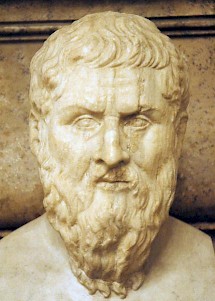Plato
Plato (427-347): Athenian philosopher, student of Socrates, and one of the most influential thinkers of all ages.

The Athenian philosopher Plato is usually called a pupil of Socrates, but his ideas are no less inspired by Parmenides of Elea. Plato accepted the world of the phenomena as a mere shadow of the real world of the ideas. When we observe a horse, we recognize what it is because our soul remembers the idea of the horse from the time before our birth. In Plato's political philosophy, only wise men who understand the dual nature of reality are fit to rule the country.
He made three voyages to Syracuse on Sicily to establish his ideal state (text), both times without lasting results.
Plato's hypothesis that our soul was once in a better place and now lives in a fallen world made it easy to combine platonic philosophy and Christianity, which accounts for the popularity of Platonism in Late Antiquity. One element, however, was not acceptable: the idea of platonic love - a homosexual relation with pedagogical aspects.
Literature
A biography was included in the Lives of Eminent Philosophers by Diogenes Laertius (here).